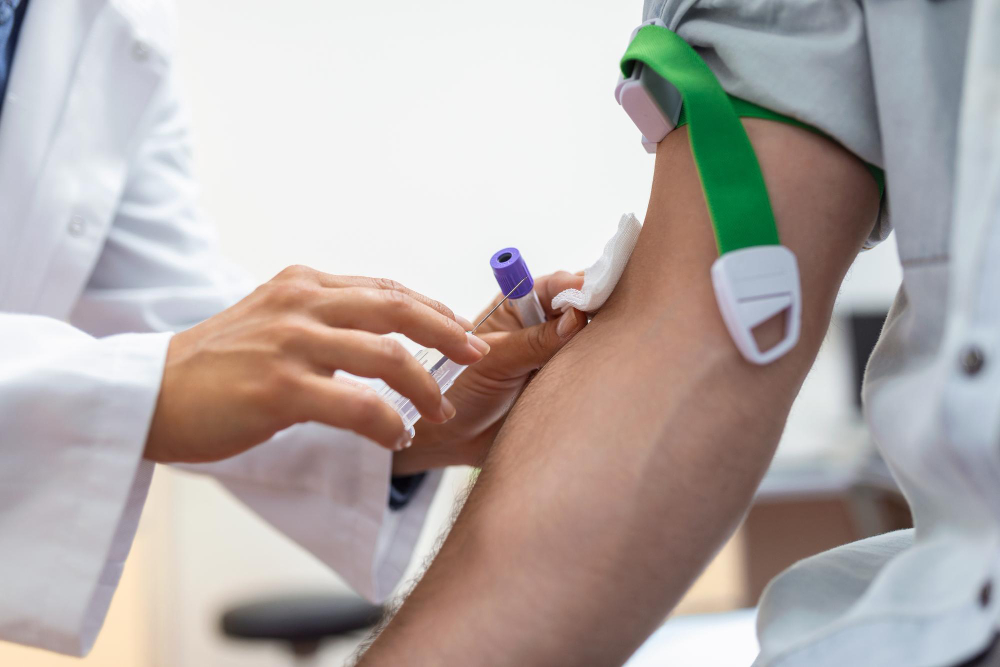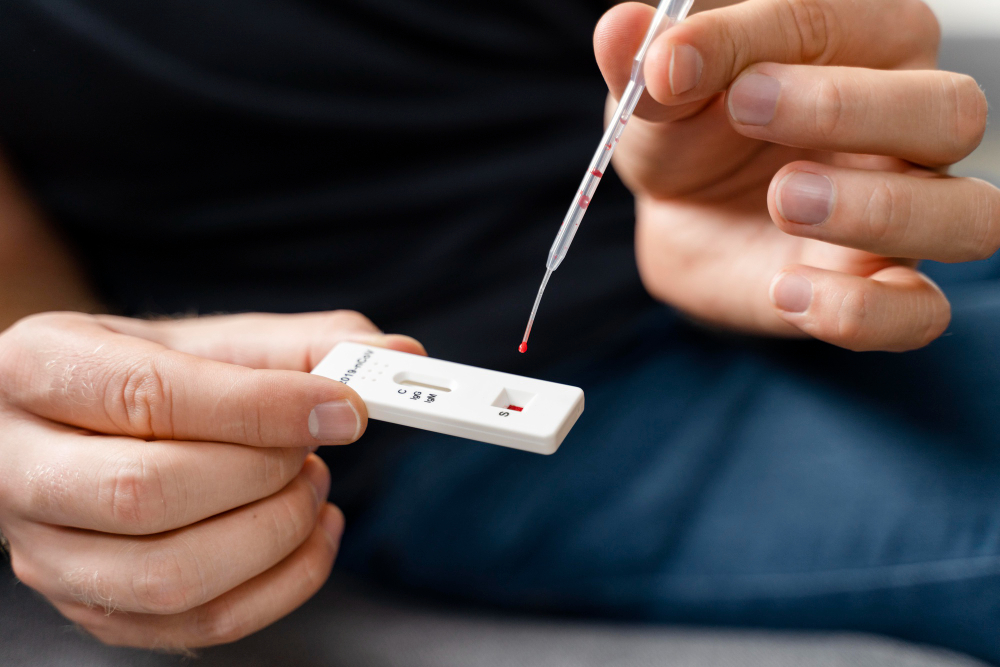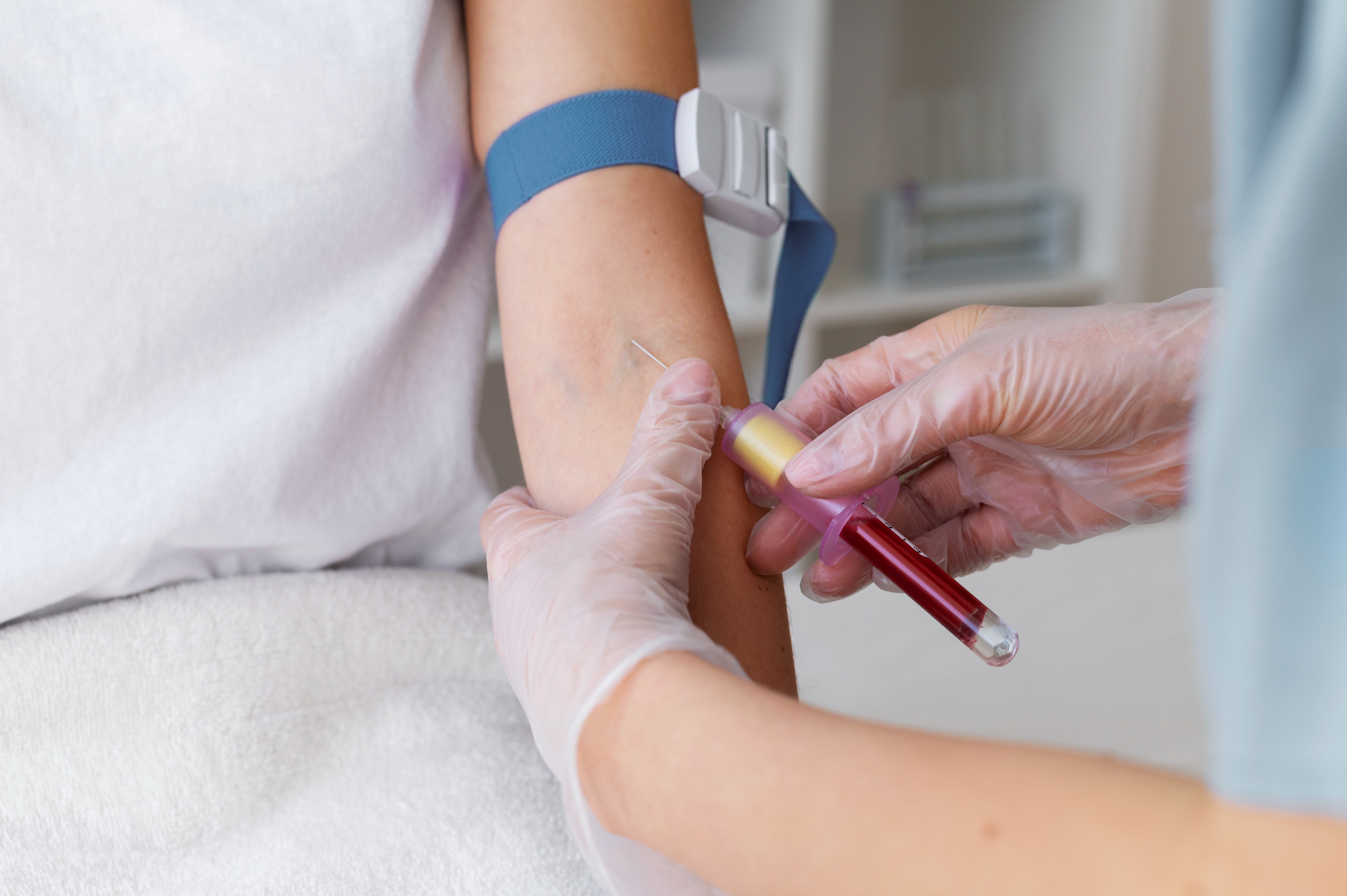Book on Whatsapp
9892101616
Understanding RDW in Blood Test: A Comprehensive Guide
Blood Test
Mon Nov 06 2023
When you undergo a routine blood test you may come across various abbreviations and terms which can be confusing at times. One such term is RDW which stands for Red Blood Cell Distribution Width. RDW is an important parameter measured during a complete blood count (CBC) test. Let's dive into the meaning of RDW, its significance, and what abnormal results can indicate.
What is RDW?
RDW refers to the variation in the size of red blood cells (RBCs) in a blood sample. It measures the difference in volume of individual RBCs and provides insights into the distribution or heterogeneity of cell sizes. The RDW value is presented as a percentage reflecting the width of the histogram curve of RBC volume.
Significance of RDW:
The RDW value is primarily used to evaluate and diagnose various types of anemia. Anemia is a condition where the body lacks sufficient healthy red blood cells to carry an adequate amount of oxygen to the tissues. RDW helps in differentiating between different types of anemia.
1. Iron Deficiency Anemia: This is the most common type of anemia and is associated with a high RDW value. In this condition, the body lacks sufficient iron to produce healthy red blood cells leading to a wide variation in the size (anisocytosis) of RBCs.
2. Vitamin B12 Deficiency Anemia: This type of anemia is caused by a deficiency in vitamin B12 which is essential for the production of healthy red blood cells. It is characterized by macrocytic (larger than normal) RBCs and an elevated RDW.
3. Folate Deficiency Anemia: Similar to vitamin B12 deficiency anemia this condition is caused by a deficiency in folic acid. Like B12 deficiency it leads to macrocytic RBCs and an increased RDW.
4. Hemolytic Anemia: Hemolytic anemia is a condition where the breakdown of red blood cells exceeds their production. In this condition, the RDW value may be elevated due to the presence of both smaller RBCs (microcytic) and larger RBCs (macrocytic).
5. Blood Loss: If there is acute or chronic blood loss the body produces new RBCs rapidly. This can result in a wide range of RBC sizes and an increased RDW value.
Interpreting Abnormal RDW Results:
RDW value outside the normal range may indicate an underlying health condition and should be further investigated by a healthcare professional. A high RDW value suggests a varied range of RBC sizes while a low RDW value indicates a more uniform distribution.
It is essential to consider RDW in combination with other CBC parameters to determine the underlying cause accurately. Your healthcare provider will assess your complete blood count results and consider your medical history symptoms and additional tests if required.
RDW is an important parameter measured during a complete blood count test and provides valuable information about the variation in red blood cell sizes. It aids in the diagnosis and differentiation of various types of anemia. If you receive abnormal RDW results it is essential to consult a healthcare professional who will interpret the findings in the context of your overall health and additional diagnostic tests if necessary. Remember timely detection and treatment of anemia can help improve your overall well-being.
Manipal TRUtest provides comprehensive diagnostic services with assured quality, accuracy, and trust backed by 70 years of Manipal legacy. You can choose our Inhalation Allergy panel which offers detection of 33 allergens. Get Home Sample Collection and a well-qualified phlebotomist shall visit you at the comfort of your home.
Related Tests
Related Packages
Related Blogs

Blood Test
Why Choose Manipal TRUtest for Blood Test Home Collection?
In a fast-paced life, it is very difficult to give time for regular health check-ups. So, you can imagine the boom of accuracy with convenience and trust, right at your doorstep is where Manipal TRUtest Blood Test Home Collection arrives from. With the lineage of the Manipal healthcare ecosystem, Manipal TRUtest makes diagnostic testing more convenient, safer, and reliable right at your doorstep, providing you with access to quality healthcare whenever you need.
1. Trusted Name with Medical Excellence
Manipal TRUtest is backed by decades of experience in healthcare and diagnostics. With NABL-certified labs and proficient staff, every sample is tested with precision you can rely on. Such a strong medical base is a guarantee of accuracy in any diagnostic service. When it is about your health, you deserve to trust, much like what Manipal TRUtest offers.
2. Hassle-Free Home Sample Collection
No more waiting in clinic lines or stressing out about traffic. With Manipal TRUtest, professional phlebotomists come to your home or office at a time convenient for you. This is a service that is meant to work on your schedule, not the other way around. Fast and seamless, the entire process from booking to sample collection is hassle-free and patient-friendly – perfect for working professionals, senior citizens & families.
3. Highly Trained & Professional Staff
All our home collection executives maintain high hygiene and safety standards. They are trained to treat patients with care, compassion, and tenderness. Sealed and sterile tools built for one use only to secure a safe and comfortable expulsion of wax with full professionalism without drafting breath-taking.
4. Wide Range of Blood Tests
Whether it is routine blood tests or preventive health check-ups, special diagnostic profiles or specialized testing for rare diseases, Manipal TRUtest has a test for you. With such broad content, patients can address an array of health concerns from a single trusted source. Whether you are looking for basic or advanced integrity, get it all from one proven brand.
5. Fast & Accurate Reports
A timely diagnosis can be everything. Manipal TRUtest promises speedy reports that are digital and easy to understand. Sophisticated lab technology keeps pace without sacrificing precision. Records are viewed online – anytime, anywhere – for easier follow-up and consultation.
6. Technology-Driven Convenience
With online, hassle-free appointments, upfront pricing, and reports delivered to you digitally, Manipal TRUtest brings cutting-edge technology with a touch of fuss-free care. Automatic updates and digital access mean never having to scramble for your latest issue. The whole process is meant to be timesaving yet extremely clear at each stage.
7. Ideal for Preventive Healthcare
Routine health checks are always important for a life-long healthy living. Manipal TRUtest promotes preventive health care with home visit services. When preventive testing is easy, people and families can better monitor their health while still fitting it into their busy schedules.
Your Health, Made Simpler
Choosing Manipal TRUtest for blood test home collection, means choosing accuracy and convenience from the comfort of your home. Make a booking for a home visit today and see for yourself – taking care of your health has never been easier!

Blood Test
What Do Your HbA1C Test Results Mean?
Blood sugar goes up and down all the time, but what matters for your health isn’t whether it has a good or bad day. It’s the number that reflects this long-term pattern, HbA1C. It indicates how much glucose has been sticking to your red blood cells over the past two to three months, providing a clear and reliable picture of your average blood sugar control.
The doctor has confidence in the HbA1C as a blood test because they view it as trends over time and not a daily fluctuation. This means it’s a powerful tool for catching diabetes early, figuring out if treatment is working, and ensuring that dangerous complications are stopped before they start.
What HbA1C Actually Measures
HbA1C measures the percentage of hemoglobin in your red blood cells that has glucose attached to it. Hemoglobin carries oxygen through your body, and whenever sugar circulates in your bloodstream, some of it binds to these cells.
Since red blood cells live for about three months, this value represents your average blood sugar over that period. That is why HbA1C provides a much more meaningful view of your glucose levels than a single fasting or random reading.
Why HbA1C Is More Reliable Than Daily Sugar Readings
Food, exercise, stress, sleep, or sickness can all affect your daily glucose levels. A single normal reading does not always indicate your sugar is under control and one high number on the meter or scale doesn’t necessarily mean you have a serious problem.
The HbA1C Test Measures Long-Term Patterns, not Immediate Levels. It allows doctors to understand if your blood sugar has been in a healthy range most of the time, which is what protects your body.
Understanding Your HbA1C Levels
The HbA1C test result is given as a percentage. When the HbA1C number is lower, that is a good thing because it means there is less sugar in your blood. On the other hand, a higher HbA1C number is not so good because it means more sugar has been in your blood. Knowing the HbA1C result is important .
- Below 5.7% is considered healthy
- 5.7% to 6.4% suggests prediabetes
- 6.5% or above indicates diabetes
For those who already have diabetes, doctors typically try to keep HbA1C levels at around 7%, although individual targets may vary by age and general health.
What High HbA1C Means for Your Body
A high HbA1C indicates your blood sugar has been elevated for weeks or months. This results in gradual injury to blood vessels and nerves, even when you feel fine.
Over time, this raises the risk of heart disease, kidney failure, vision issues, nerve pain, and delayed wound healing. If you have a lot of the above issues, then high HbA1C is likely first warning that these problems will arrive soon.
What Low HbA1C Tells You
Lower levels of HbA1C are generally associated with better blood sugar control. But deeply low levels among those who take diabetes medications could be a sign of frequent low blood sugar, she said.
Low blood sugar can lead to weakness, sweating, dizziness, confusion, and even passing out. That is why the goal for doctors is balanced control, not numbers that are too low.
Why HbA1C Can Rise Even With a Healthy Diet
Food is a key factor, but not the only one that influences blood sugar. Stress, poor sleep, sickness, hormonal changes, and lack of movement all increase glucose levels. HbA1C is the average of all this, and that’s why this number may go up when you haven’t changed your diet.
How Often HbA1C Should Be Checked
Most people without diabetes will check HbA1C once a year. For people who have prediabetes, the testing interval should be six months; for those diagnosed with diabetes, it is often three. Frequent monitoring can detect high levels of sugar at an early stage and help prevent long-term complications.
How to Improve HbA1C Naturally
Small daily habits matter a great deal for HbA1C. Stable blood sugar is supported by eating balanced meals, staying physically active, sleeping well, managing stress, and taking medications as prescribed.
How HbA1C Helps Protect Your Future
HbA1C is more than a test number. It is a long-term health signal indicating whether your body has been protected against damage from sugar. Keeping HbA1C within a healthy range, in turn, reduces the risk of heart disease, kidney problems, nerve damage, and vision loss.
With today’s accessible healthcare, you can get an HbA1C Blood Test at home without visiting the lab and keep track of sugar control at ease. This added convenience means more people can stay consistent with testing, identify changes early, and take action to help protect their long-term health.
At Manipal TRUtest, we make diabetes monitoring simple and reliable with accurate HbA1c testing, preventive health packages, and convenient home sample collection services.
Stay informed, stay in control—book your HbA1c test today and take a proactive step toward better health.

Blood Test
Skip the Lab Queue with Easy and Reliable Blood Test Home Collection
In a world where time is increasingly precious, convenience has become more than a luxury—it is a necessity. One area where this shift is particularlyespecially evident is healthcare, especially particularly diagnostic testing. Long queues at laboratories, busy schedules, and concerns about exposure to infections have encouraged people to seek safer and more convenient alternatives. Among these, blood test home collection services have emerged as a game-changing solution, offering efficiency, comfort, and reliability right at your doorstep.
Convenience That Fits Your Lifestyle
Traditionally, getting a blood test meant scheduling an appointment, commuting to a diagnostic center, and often waiting in crowded lobbies. For those with demanding jobs, mobility challenges, or caregiving responsibilities, this process can feel overwhelming. Home collection eliminates these barriers by bringing certified professionals straight to you. Whether you prefer early mornings before work, evenings after your day has settled, or weekends, home sample collection adapts to your timetable—not the other way around.
This flexibility is invaluable particularly helpful for elderly patients, individuals with chronic illnesses, new parents, and those with limited mobility. With just a few clicks, you can book a test online, and a trained phlebotomist will arrive to collect your sample with care and precision.
Comfort, Privacy, and a Stress-Free Environment
For many people, hospitals and laboratories can be intimidating spaces. The sterile environment, the presence of other patients, and the general rush can create unnecessary anxiety. When samples are collected at home, you remain in a familiar and comfortable environment. This ease can significantly reduce stress, especially for children or people with a fear of needles.
Privacy is another major advantage. Sensitive health conditions often require diagnostic tests, and not everyone feels comfortable being seen at medical centers. Home collection offers a discreet alternative, ensuring confidentiality from the moment you book the service to the point when your digital report arrives.
Reliable, Professional, and Safe Procedures
One of the common misconceptions is that home collection might compromise accuracy or safety. However, reputable diagnostic services follow stringent protocols. Certified phlebotomists use sterile, single-use equipment, adhere to medical-grade hygiene standards, and ensure samples are handled with absolute care. Once collected, samples are sealed, labeled, and transported under controlled conditions to accredited laboratories.
Modern Diagnostic companies, these days, use real-time tracking systems, allowing you to monitor your sample’s status and receive timely updates. Reports are usually delivered digitally within hours or days, depending on the type of test. This combination of professional handling and seamless digital integration ensures that home collection is as dependable as visiting a lab—if not more so.
Ideal for Regular Monitoring and Preventive Care
Many people require periodic testing—whether for diabetes, thyroid disorders, vitamin deficiencies, cholesterol, or routine health checkups. Home collection makes these regular assessments significantly more manageable. Instead of delaying or skipping tests due to lack of time or inconvenience, individuals can stay on top of their health effortlessly.
Preventive care has gained growing importance, and early detection often leads to better treatment outcomes. When diagnostic testing becomes easier, people are more likely to engage in preventive screening, helping them identify issues early and take proactive steps toward better health.
A Safe Option in Today’s Health-Conscious World
The pandemic has transformed how individuals view healthcare spaces. Even as the world adapts, many people still prefer minimizing unnecessary exposure. Home collection remains an excellent option for those who value safety and minimal contact. The phlebotomists follow rigorous sanitization protocols, ensuring a safe interaction for both patients and professionals.
Embrace Smarter Healthcare From Home
Blood test home collection is more than a convenience—it represents the future of patient-centered healthcare. It allows you to take charge of your health without disrupting your day, waiting in long queues, or stepping into crowded spaces. With reliable technicians, accurate results, and effortless booking, it is a service designed to make healthcare simpler, safer, and faster.
As life gets busier, choosing smarter and more efficient ways to care for your health becomes essential. By opting for home blood sample collection, you prioritize comfort, accuracy, and peace of mind—all from the comfort of your own home.
This New Year, choose comfort without compromising accuracy. With Manipal TRUtest’s reliable home blood sample collection services, quality diagnostics come straight to your doorstep.
Start the year the smart way—book your tests today and experience healthcare that fits your lifestyle.
